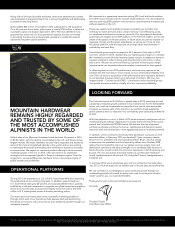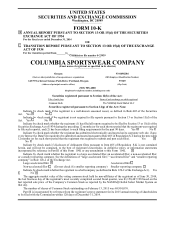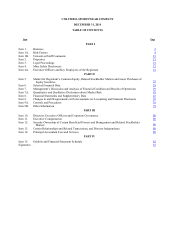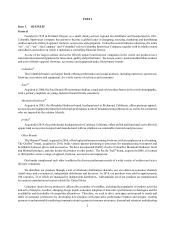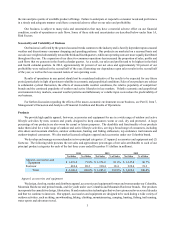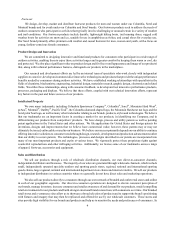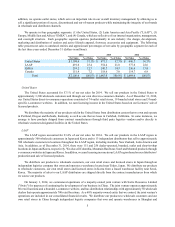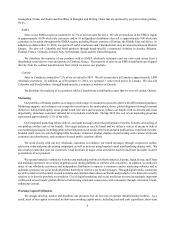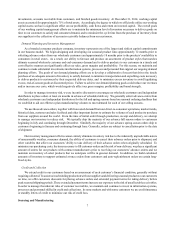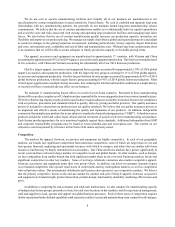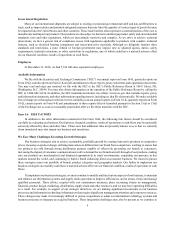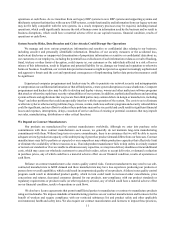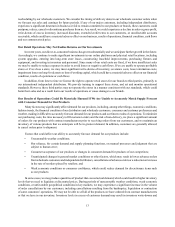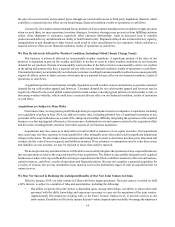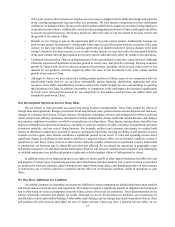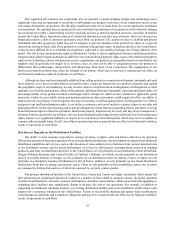Columbia Sportswear 2014 Annual Report Download - page 13
Download and view the complete annual report
Please find page 13 of the 2014 Columbia Sportswear annual report below. You can navigate through the pages in the report by either clicking on the pages listed below, or by using the keyword search tool below to find specific information within the annual report.9
Government Regulation
Many of our international shipments are subject to existing or potential governmental tariff and non-tariff barriers to
trade, such as import duties and potential safeguard measures that may limit the quantity of various types of goods that may
be imported into the United States and other countries. These trade barriers often represent a material portion of the cost to
manufacture and import our products. Our products are also subject to domestic and foreign product safety and environmental
standards, laws and other regulations, which are increasingly restrictive and complex. As we strive to achieve technical
innovations, we face a greater risk of compliance issues with regulations applicable to products with complex technical
features, such as electrical heating components and insect-protective materials. Although we diligently monitor these
standards and restrictions, a state, federal or foreign government may impose new or adjusted quotas, duties, safety
requirements, material restrictions, or other restrictions or regulations, any of which could have a material adverse effect
on our financial condition, results of operations or cash flows.
Employees
At December 31, 2014, we had 5,326 full-time equivalent employees.
Available Information
We file with the Securities and Exchange Commission (“SEC”) our annual report on Form 10-K, quarterly reports on
Form 10-Q, current reports on Form 8-K and all amendments to those reports, proxy statements and registration statements.
You may read and copy any material we file with the SEC at the SEC’s Public Reference Room at 100 F Street, NE,
Washington, D.C. 20549. You may also obtain information on the operation of the Public Reference Room by calling the
SEC at 1-800-SEC-0330. In addition, the SEC maintains an internet site at http://www.sec.gov that contains reports, proxy
and information statements, and other information regarding issuers, including us, that file electronically. We make available
free of charge on or through our website at www.columbia.com our annual reports on Form 10-K, quarterly reports on Form
10-Q, current reports on Form 8-K and amendments to these reports filed or furnished pursuant to Section 13(a) or 15(d)
of the Exchange Act as soon as reasonably practicable after we file these materials with the SEC.
Item 1A. RISK FACTORS
In addition to the other information contained in this Form 10-K, the following risk factors should be considered
carefully in evaluating our business. Our business, financial condition, results of operations or cash flows may be materially
adversely affected by these and other risks. Please note that additional risks not presently known to us or that we currently
deem immaterial may also impair our business and operations.
We Face Many Challenges Executing Growth Strategies
Our business strategies aim to achieve sustainable, profitable growth by creating innovative products at competitive
prices, focusing on product design, utilizing innovations to differentiate our brand from competitors, working to ensure that
our products are sold through strong distribution partners capable of effectively presenting our brands to consumers,
increasing the impact of consumer communications to drive demand for our brands and sell-through of our products, making
sure our products are merchandised and displayed appropriately in retail environments, expanding our presence in key
markets around the world, and continuing to build a brand enhancing direct-to-consumer business. We intend to pursue
these strategies across our portfolio of brands, product categories and geographic markets. Our failure to implement our
business strategies successfully could have a material adverse effect on our financial condition, results of operations or cash
flows.
To implement our business strategies, we must continue to modify and fund various aspects of our business, to maintain
and enhance our information systems and supply chain operations to improve efficiencies, and to attract, retain and manage
qualified personnel. These efforts, coupled with cost containment measures, place increasing strains on management,
financial, product design, marketing, distribution, supply chain and other resources, and we may have operating difficulties
as a result. For example, in support of our strategic initiatives, we are making significant investments in our business
processes and information technology infrastructure that require significant management attention and corporate resources.
These changes may make it increasingly difficult to pursue acquisitions or adapt our information technology systems and
business processes to integrate an acquired business. These integration challenges may also be present as we continue to


